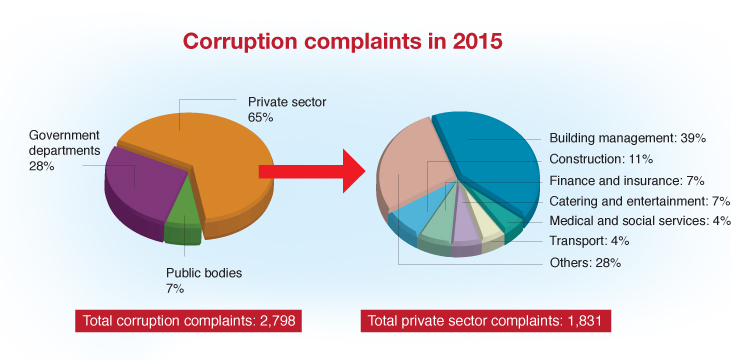Hong Kong continued to prevail as one of the most exciting business hubs, boasting a clean civil service, a level playing field and a community that loathed corruption, said Mr Chow Chung-kong, Chairman of the Advisory Committee on Corruption (ACOC), which oversees the overall operation and policy matters of the ICAC.
Speaking at a recent annual press briefing, Mr Chow said international organisations, including the Heritage Foundation, consistently regarded Hong Kong as highly corruption-free.
Last month, the Index of Economic Freedom released by the Heritage Foundation, an influential public policy research institute based in the United States, ranked Hong Kong as the world’s freest economy for the 22nd consecutive year among 178 economies assessed.
Measuring the degree of economic freedom by assessing 10 factors, including “freedom from corruption”, the Heritage Foundation remarked that “the prosecution of a high-profile property developer for bribery in late 2014 illustrated why corruption rates remain low”.
 Earlier, Berlin-based Transparency International, a non-governmental organisation that monitors corruption in international development, published the annual Corruption Perceptions Index (CPI). Earlier, Berlin-based Transparency International, a non-governmental organisation that monitors corruption in international development, published the annual Corruption Perceptions Index (CPI).
According to the CPI 2015, Hong Kong was ranked the 18th least corrupt place among 168 countries and territories surveyed, sharing with Japan the second cleanest place in Asia.
The good news was that Hong Kong’s overall score improved by one point from 74 to 75, indicating that the corruption situation remained stable, despite a slight drop of one place in the ranking.
Mr Chow further revealed that according to the 2015 ICAC Annual Survey, only 1.3 per cent of respondents had come across corruption in the past 12 months, a 0.2 percentage point lower than the previous year, showing a very low level of corruption in Hong Kong.
Almost all respondents or 99 per cent considered that keeping Hong Kong corruption-free was important to the overall development of the city, Mr Chow added.
Hong Kong people remained highly intolerant of corruption. The survey showed that on a scale of 0 to 10, with 0 representing total rejection and 10 representing total acceptance of corruption, the mean score for 2015 was 0.6, the lowest score since the question was first raised in 2010.

 In 2015, the ICAC received 2,798 corruption complaints, a rise of 18 per cent compared to 2,363 complaints received in 2014. Pursuable complaints increased by 25 per cent from 1,561 to 1,950. In 2015, the ICAC received 2,798 corruption complaints, a rise of 18 per cent compared to 2,363 complaints received in 2014. Pursuable complaints increased by 25 per cent from 1,561 to 1,950.
Mr Chow said the statistics should not be interpreted in a pejorative sense. Rather, he considered the increase in corruption complaints the fruitful result of the ICAC’s continuous publicity campaign in the past year to encourage the public to report corruption.
Over the years, the ICAC has spared no efforts to foster ethical governance in the business sector. Last year, a three-year ethics promotion programme was launched for listed companies, comprising the production of a practical guide and a training package for directors and senior executives of listed companies respectively.
 The year 2015 marked the 30th Anniversary of the Advisory Services Group. The ICAC took the opportunity to rebrand the unit as the Corruption Prevention Advisory Service (CPAS), further expanding its services to raise the private sector’s corruption prevention awareness. Among the new features are a web portal comprising a cyber-learning resource centre, newsletters and corruption prevention tips to be launched later this year. The year 2015 marked the 30th Anniversary of the Advisory Services Group. The ICAC took the opportunity to rebrand the unit as the Corruption Prevention Advisory Service (CPAS), further expanding its services to raise the private sector’s corruption prevention awareness. Among the new features are a web portal comprising a cyber-learning resource centre, newsletters and corruption prevention tips to be launched later this year.
|

